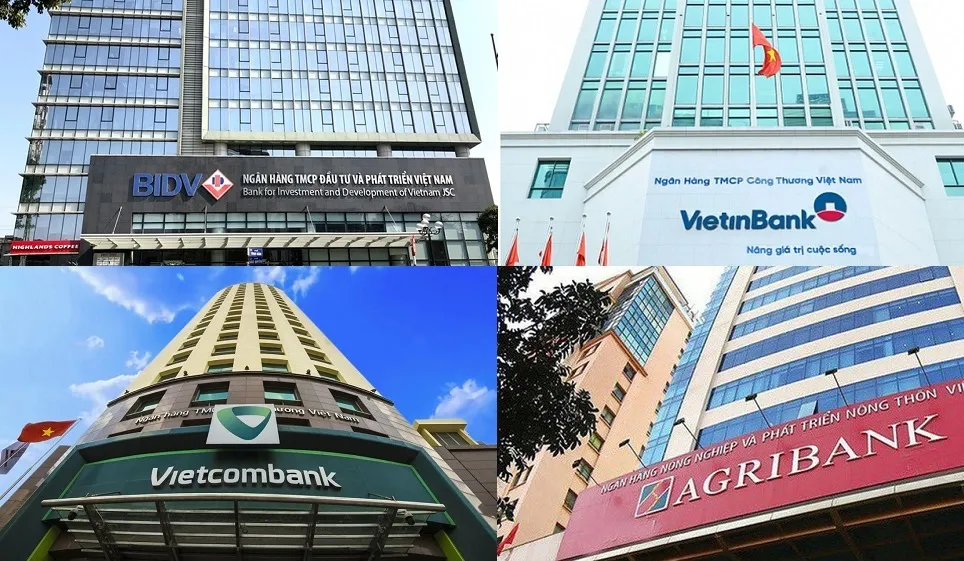
Despite their size and market leadership, these banks have been unable to significantly bolster their capital, a situation that could impact their ability to expand credit, maintain financial stability, and retain their dominant position.
This article explores the recent struggles of the Big 4 in raising charter capital, examines the factors behind the delays, and looks at how their competitors are taking advantage of this situation.
Stalled Progress in Charter Capital Growth
Raising capital has long been on the agenda for the Big 4, yet progress remains slow. Vietcombank, for instance, has had plans to increase its charter capital for several years but has faced continuous delays. Back in January 2019, the bank issued 94.4 million shares (equivalent to 2.55% of its charter capital) to GIC Private Limited, Singapore’s national investment fund, and 16.6 million shares (0.4%) to Mizuho Bank from Japan. This issuance raised VND 6.2 trillion. Following this success, Vietcombank planned to issue another 6.5% of shares, amounting to 307.6 million shares, with 46.1 million shares reserved for Mizuho Bank and the remaining for other investors.
Despite these ambitious plans, the process has been plagued by delays. By 2023, Vietcombank stated that it was in the process of hiring consultants to implement the private issuance, but the plan has yet to materialize. Most recently, in June 2024, the bank’s Board of Directors passed a resolution to finalize the issuance plan but later withdrew the proposal from the agenda, further stalling progress.
A similar story can be seen with BIDV, which successfully issued a private placement to KEB Hana Bank in 2019, raising nearly VND 20.3 trillion at VND 33,640 per share. In 2022, BIDV proposed issuing an additional 9% of its shares, a plan that analysts estimated could raise over VND 27 trillion. However, despite engaging with 38 potential investors by 2023, the bank has been unable to execute the plan. In its 2024 capital increase strategy, BIDV proposed issuing 1.36 billion new shares, which could increase its charter capital from VND 57 trillion to over VND 70 trillion. Yet, progress remains sluggish, with a mix of dividend payments and private placements planned but no immediate execution.
Regulatory Delays and Bottlenecks
The Big 4 banks face significant regulatory hurdles in raising capital. VietinBank, for instance, has been awaiting approval from both the State Bank of Vietnam and the Ministry of Finance to retain all 2022 profits for capital increases. The bank has also proposed retaining all profits from 2023 to 2028 to further bolster its charter capital. However, as of now, no additional capital has been injected, leaving the bank’s financial capacity stagnant.
Agribank is the only bank in the Big 4 to have managed a capital increase this year, raising its charter capital from VND 34.2 trillion to VND 40.9 trillion after receiving approval from the National Assembly. However, this increase is modest compared to other banks, leaving Agribank still behind its joint-stock commercial counterparts. The National Assembly has approved an additional capital injection of VND 10.3 trillion for 2024, but even this will leave Agribank trailing behind its competitors in terms of charter capital.
These regulatory delays present a significant bottleneck for the Big 4. While smaller, joint-stock banks can raise capital through shareholder agreements and market placements, state-owned banks like the Big 4 must navigate a lengthy approval process involving multiple government entities, including the State Bank, the Ministry of Finance, and even the National Assembly. This time-consuming process puts these banks at a disadvantage in an increasingly competitive market.
While the Big 4 banks struggle with regulatory delays and slow capital increases, their competitors in the joint-stock commercial banking sector are rapidly raising their charter capital, shifting the balance of power in Vietnam’s banking landscape. VPBank, for instance, has aggressively increased its charter capital, reaching VND 67.4 trillion by 2022 and surpassing three of the Big 4. The bank’s capital has since risen to VND 79.3 trillion, making it the largest in the banking system.
Similarly, Techcombank has completed a capital increase to VND 70.4 trillion, catapulting it from ninth place to second place in terms of charter capital. MB, another competitor, has also rapidly increased its capital to VND 52.8 trillion, closing in on VietinBank. ACB has raised its capital to VND 44.6 trillion, surpassing Agribank, while numerous smaller banks are preparing to boost their capital buffers through dividend payments.
This rapid capital growth among joint-stock banks is beginning to shift the competitive landscape. If the Big 4 continue to struggle with capital increases, they may fall further behind in both the rankings and their ability to dominate the market. More importantly, their inability to raise capital could limit their credit growth and weaken their ability to lead the banking system.
The Big 4’s difficulty in raising charter capital has significant implications for both their operations and the broader banking system. According to the State Bank of Vietnam, the capital adequacy ratio (CAR) for credit institutions and foreign bank branches applying Circular 41/2016/TT-NHNN was 11.96% as of June 2024. However, state-owned commercial banks, including the Big 4, only achieved a CAR of 9.99%, lagging behind joint-stock commercial banks (11.86%) and foreign banks (21.96%).
Without a sufficient capital buffer, the Big 4 face constraints in expanding their credit portfolios. This could limit their ability to meet the growing demand for loans and other financial services, which is essential for maintaining their market leadership. As the government seeks to ensure financial stability and promote economic growth, the Big 4’s inability to raise capital could hinder their contribution to these goals.




















